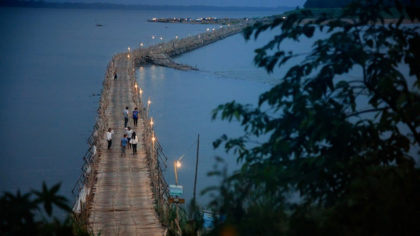The Bamboo Bridge

Juan Francisco Salazar | 2019 | Australia | 65
Every dry season, a 1.5km bamboo bridge has been built across the Mekong River to the island of Ko Pen in Cambodia. Every year, the bridge is dismantled in the wake of the monsoonal tides and recycled for the following year. In 2017, this bridge was built for the last time when a massive new government funded concrete bridge was inaugurated as the country embraces China’s One Belt One Road initiative. Through a slow and gentle rhythm, the film engages with three generations of bridge builders who share stories of this unique sustainable infrastructure and the diverse community economies and ecologies it sustained. Focusing on the last master builder, Mr Oun, the film explores the subtle intricacies of traditional forms of sustainable living with the rhythms of local ecosystems and the cycles of bamboo. The river, the monsoon, the people, and the bridge all tell an urgent and primal story. Are we listening?
European Premiere
Production Company: Matadora Films
Producer: Alejandra Canales, Claire Fletcher
Director Biography
Juan Francisco Salazar is a Sydney-based, Chilean anthropologist, author and documentary filmmaker. He is a Professor at Western Sydney University where he teaches documentary film studies. For over 20 years he has undertaken ethnographic research and audiovisual work in Australia, Chile, Antarctica, Colombia, Cambodia, and Vanuatu. His previous films have been screened internationally in over 25 countries.
Director Statement
The river, the monsoon, the people, and the bridge all tell an urgent and primal story. Are we listening? The Bamboo Bridge has some lessons for us about living differently with each other and with nature. But in order to receive its teaching we might need to shift into an unfamiliar mode of thinking—one that calls forth speculation, also uncertainty, perhaps awe. And onto a bamboo bridge that undulates under foot, that squeaks and sighs. Under you is the mighty Mekong, one of the world’s longest rivers that supports the livelihoods of 70 million people.
This film is a collaboration will the internationally known economic geographer Katherine Gibson to tell a story of how this infrastructure still operates within a dynamic community economy of ethically negotiated co-existence. Bridges are infrastructures that connect. As material forms they allow for the possibility of connection and exchange over space. Both the bamboo bridge and the concrete bridge are connecting two worlds. The rural village island world/s and the bustling city of Kampong Cham. However, they also shape the nature of diverse livelihoods, the speed and direction of movement, its temporalities, and its vulnerability to breakdown in very different ways. As a technopolitics, that seems far removed from formal political institutions, the concrete bridge imposes a rhythm of 24/7 connectivity, of modern development, bringing electricity and roads to the island but oblivious to the rhythms of the river, and the monsoon. It organises populations and territories through infrastructure. As a material-semiotic device, the bamboo bridge is instead a world in its own that brings forms of life together. It moves, it breaks, it repairs, it groans and howls, it smells, it changes colour. It has a sensory affect. People fish from it, people marry on it; people swim next to it; people are together on it and with it.

